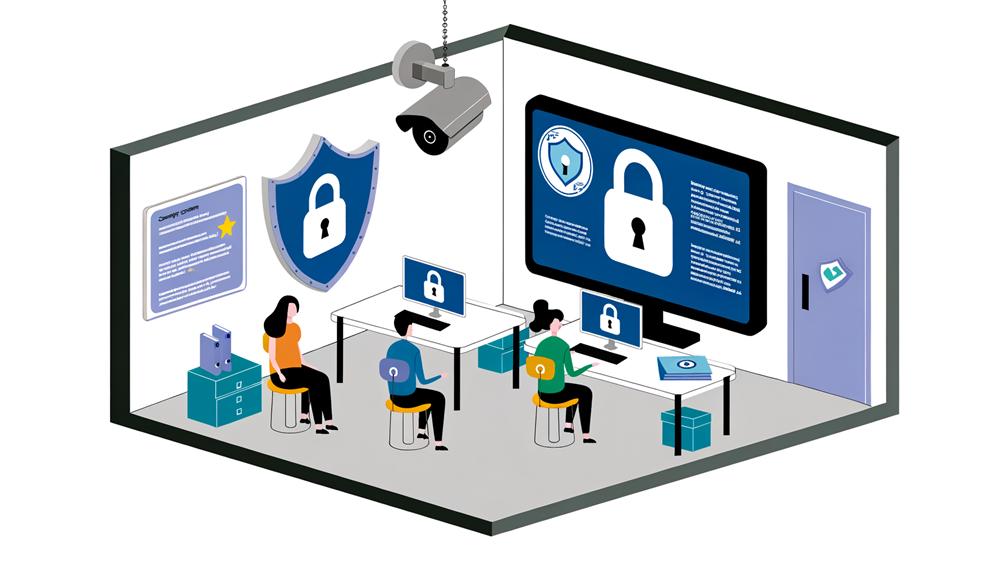Table of Contents Show
You need to safeguard your small business data to avoid devastating cyber attacks that can shut you down. Start with a strong password policy, changing them regularly and using multi-factor authentication. Train your employees to recognize phishing and other threats, since 88% of breaches are their mistakes. Assess risks thoroughly to identify vulnerabilities. Use firewalls and VPNs to secure your network, and encrypt sensitive data to keep it safe from unauthorized access. Regular backups are essential; they can save you from permanent data loss. Keep your business protected and you'll guarantee its longevity and security remains intact. Learn how each step helps.
Key Takeaways
- Implement robust cybersecurity measures to protect sensitive data and ensure business continuity.
- Regularly conduct risk assessments to identify and mitigate potential vulnerabilities.
- Train employees to recognize and avoid phishing scams and other security threats.
- Use strong passwords and multi-factor authentication to prevent unauthorized access.
- Encrypt sensitive data to protect it from unauthorized access and comply with regulations.
Importance of Cybersecurity
Given the rising number of ransomware attacks, it's clear that cybersecurity is essential for protecting your small business. Cyber threats like malware, ransomware, social engineering, and phishing can wreak havoc on your business by targeting sensitive data and disrupting operations. It's important to understand that safeguarding your business with robust cybersecurity measures can save you time, money, and resources in the long run.
Your small business holds valuable information, from customer details to financial records. Without proper cybersecurity, this data is at risk. Imagine losing access to your critical business information due to a cyber attack. Only 55% of encrypted and destroyed data is successfully recovered, which means you could lose half of your important data permanently. This makes it critical to protect your data from cyber threats.
Implementing strong security measures helps protect your business from these risks. It's not just about preventing attacks; it's about ensuring the continuity of your business operations. By prioritizing cybersecurity, you can secure your data and maintain trust with your customers.
Risk Assessment Strategies
To effectively protect your small business from cyber threats, start with a thorough risk assessment to identify potential vulnerabilities in your IT infrastructure. This first step is essential because 60% of small businesses shut down within six months of an attack. Understanding your vulnerabilities helps you develop effective protection plans that follow cybersecurity best practices.
Begin by examining your entire IT infrastructure. Look for weak spots that could lead to financial losses or reputation damage. These vulnerabilities can be anything from outdated software to unsecured networks. Once identified, you can implement measures to strengthen them. This proactive approach is crucial in mitigating the impact of cyber threats.
Consider hiring an outside expert to assist with your risk assessment. Professionals bring valuable insights and can recommend specific security measures tailored to your business needs. Remember, the goal is to shield your business from potential threats before they become a problem.
Moreover, prioritize creating detailed protection plans. These plans should outline procedures for preventing attacks and responding if a breach occurs. By addressing your business's specific risks and vulnerabilities, you can better safeguard against cyber threats and ensure the longevity of your operations.
Employee Training Programs

Employee training programs are essential for bolstering your small business's defenses against cyber threats. When employees aren't adequately trained, they're more likely to make mistakes that lead to security breaches. In fact, 88% of data breaches are due to employee mistakes. Training helps staff recognize threats like phishing emails and other security risks, reducing the chance of a costly breach.
Implementing thorough employee training programs can greatly improve your business's security. These programs should focus on increasing employee cybersecurity awareness and providing practical knowledge about cyber threats. CISA offers free online training and exercises that can be a valuable resource for your team.
By educating your employees about common cyber threats, you equip them with the skills to combat potential security risks effectively. The key to enhancing security lies in making sure your employees understand the importance of their role in protecting your business. Encourage regular training sessions and updates to keep cybersecurity practices fresh in their minds.
When your team can recognize threats and respond appropriately, your business becomes much more resilient against cyberattacks. Don't wait for a breach to happen—start your employee training programs today.
Strong Password Policies
Implementing robust password policies is essential for protecting your small business against cyber threats. Strong passwords can prevent 80% of data breaches, making them a critical part of your cybersecurity strategy. Your passwords should be at least 12 characters long, using a mix of letters, numbers, and special characters. This complexity makes them harder to crack, safeguarding your sensitive information.
Regularly changing passwords is another key practice. It can thwart 60% of hacking attempts by ensuring that old, potentially compromised passwords don't remain in use.
To further reduce the risk of unauthorized access, implement multi-factor authentication. This method can lower the chances of a breach by 99%, adding an extra layer of security to your systems.
Password managers are invaluable tools for small businesses. They can securely store and generate complex passwords for different accounts, making it easier to maintain strong password policies without the hassle of remembering each one.
Data Encryption Methods

Encrypting your data is a fundamental way to secure sensitive information and protect your business from cyber threats. Data encryption converts your data into a code that can only be accessed with a decryption key. This makes it unreadable to anyone without authorization, safeguarding your privacy and reducing the risk of data breaches.
Adopting advanced encryption standards like AES (Advanced Encryption Standard) ensures that your sensitive data is well-protected. Here are three key reasons to implement data encryption practices:
- Prevent Unauthorized Access: Encryption protects data at rest, in transit, and in use, ensuring that hackers can't easily access your sensitive data.
- Compliance Regulations: Many laws and regulations require businesses to encrypt sensitive data to meet legal and ethical data protection standards.
- Privacy Protection: Encrypted data maintains privacy, keeping your information secure from prying eyes and unauthorized disclosure.
Using these encryption methods, you can strengthen your defenses against potential cyber threats. Remember, it's vital to manage your decryption keys securely. Losing a decryption key means you could lose access to your own data. Prioritize data encryption to guarantee robust data protection practices and keep your business safe.
Network Security Basics
Beyond encrypting your data, securing your network is another vital step to protect your small business from cyber threats. As a small business owner, you must prioritize network security to prevent data loss and reduce security risks.
Start by implementing firewalls to filter both inbound and outbound traffic. Firewalls help block unauthorized access, keeping your network secure.
Next, consider using intrusion detection systems. These systems generate real-time alerts about potential security breaches, allowing you to act quickly to protect your business.
Don't overlook the importance of endpoint security either. Each device connected to your network is a potential entry point for cyber threats. Make sure all endpoints, including computers and mobile devices, have up-to-date security software.
Securing your Wi-Fi network is essential. Use strong, unique passwords and enable WPA3 encryption. Regularly update your router's firmware to close any security gaps.
Adopting these security practices helps you comply with industry standards and regulations, adding an extra layer of protection.
Regular Data Backups

To guarantee your business can quickly recover from cyberattacks or hardware failures, regular data backups are essential. Small businesses are particularly vulnerable, and data loss can be catastrophic. Did you know that 60% of small businesses shut down within six months of a cyberattack due to data loss? Regular backups can prevent this.
Here's why you need to make data backups a priority:
- Prevent Data Loss: Regular backups guarantee that your sensitive information is safe even if your systems are compromised. Cyberattacks or hardware failures won't result in permanent data loss.
- Maintain Business Continuity: Daily or weekly backups help keep your business operations running smoothly. You can quickly restore your data and continue working without significant disruption.
- Utilize Cloud Backup Services: These services offer secure and convenient storage solutions. Cloud backups are accessible from anywhere, providing an extra layer of protection against data loss.
Utilizing Firewalls and VPNs
Protect your small business's network by implementing firewalls and VPNs to block unauthorized access and secure remote connections. Firewalls act as a barrier between your network and potential cyber attacks, filtering traffic to guarantee only safe data passes through. This is vital for defending against malware, ransomware, and phishing attacks that can cripple your operations.
VPNs (Virtual Private Networks) provide another essential layer of protection. They encrypt data, ensuring data privacy and secure remote access for your employees. This is especially important when accessing sensitive information from public networks or remote locations. Without VPNs, your data can be exposed to cyber criminals, putting your business at risk.
By leveraging firewalls and VPNs, you enhance your small business's security posture to a great extent. These tools not only protect against immediate threats but also help maintain the integrity of your data privacy. Think of firewalls as your first line of defense, while VPNs safeguard the data that flows through your network.
Don't wait for a cyber attack to highlight the vulnerabilities in your network. Take proactive steps now to implement firewalls and VPNs. Protect your business, your data, and your future.
Conclusion
Don't wait until it's too late. Safeguarding your small business's data is essential. A breach can cost you time, money, and trust.
By following these cyber tips—assessing risks, training employees, using strong passwords, encrypting data, securing your network, backing up data, and utilizing firewalls and VPNs—you can protect your business.
Remember, "An ounce of prevention is worth a pound of cure." Act now to secure your future and stay ahead of cyber threats.




